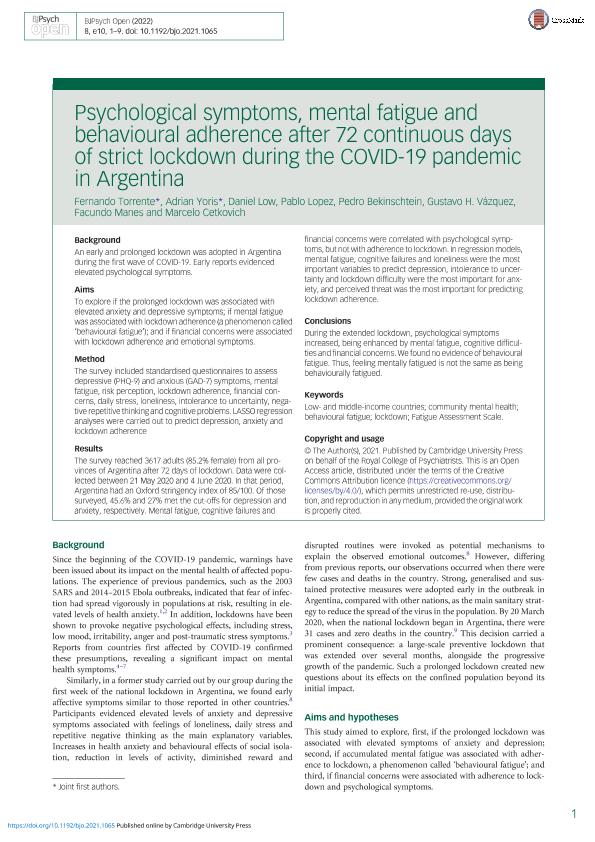Artículo
Psychological symptoms, mental fatigue and behavioural adherence after 72 continuous days of strict lockdown during the COVID-19 pandemic in Argentina
Torrente, Fernando Manuel; Yoris Magnago, Adrián Ezequiel ; Low, Daniel Mark; Lopez, Pablo Luis; Bekinschtein, Pedro Alejandro
; Low, Daniel Mark; Lopez, Pablo Luis; Bekinschtein, Pedro Alejandro ; Vázquez, Gustavo H.; Manes, Facundo Francisco
; Vázquez, Gustavo H.; Manes, Facundo Francisco ; Cetkovich Bakmas, Marcelo Gustavo
; Cetkovich Bakmas, Marcelo Gustavo
 ; Low, Daniel Mark; Lopez, Pablo Luis; Bekinschtein, Pedro Alejandro
; Low, Daniel Mark; Lopez, Pablo Luis; Bekinschtein, Pedro Alejandro ; Vázquez, Gustavo H.; Manes, Facundo Francisco
; Vázquez, Gustavo H.; Manes, Facundo Francisco ; Cetkovich Bakmas, Marcelo Gustavo
; Cetkovich Bakmas, Marcelo Gustavo
Fecha de publicación:
12/2021
Editorial:
Royal College Of Psychiatrists
Revista:
British Journal Of Psychiatry
ISSN:
0007-1250
e-ISSN:
2056-4724
Idioma:
Inglés
Tipo de recurso:
Artículo publicado
Clasificación temática:
Resumen
Background An early and prolonged lockdown was adopted in Argentina during the first wave of COVID-19. Early reports evidenced elevated psychological symptoms. Aims To explore if the prolonged lockdown was associated with elevated anxiety and depressive symptoms; if mental fatigue was associated with lockdown adherence (a phenomenon called ‘behavioural fatigue’); and if financial concerns were associated with lockdown adherence and emotional symptoms. Method The survey included standardised questionnaires to assess depressive (PHQ-9) and anxious (GAD-7) symptoms, mental fatigue, risk perception, lockdown adherence, financial concerns, daily stress, loneliness, intolerance to uncertainty, negative repetitive thinking and cognitive problems. LASSO regression analyses were carried out to predict depression, anxiety and lockdown adherence Results The survey reached 3617 adults (85.2% female) from all provinces of Argentina after 72 days of lockdown. Data were collected between 21 May 2020 and 4 June 2020. In that period, Argentina had an Oxford stringency index of 85/100. Of those surveyed, 45.6% and 27% met the cut-offs for depression and anxiety, respectively. Mental fatigue, cognitive failures and financial concerns were correlated with psychological symptoms, but not with adherence to lockdown. In regression models, mental fatigue, cognitive failures and loneliness were the most important variables to predict depression, intolerance to uncertainty and lockdown difficulty were the most important for anxiety, and perceived threat was the most important for predicting lockdown adherence. Conclusions During the extended lockdown, psychological symptoms increased, being enhanced by mental fatigue, cognitive difficulties and financial concerns. We found no evidence of behavioural fatigue. Thus, feeling mentally fatigued is not the same as being behaviourally fatigued.
Archivos asociados
Licencia
Identificadores
Colecciones
Articulos(INCYT)
Articulos de INSTITUTO DE NEUROCIENCIAS COGNITIVAS Y TRASLACIONAL
Articulos de INSTITUTO DE NEUROCIENCIAS COGNITIVAS Y TRASLACIONAL
Articulos(INECOA)
Articulos de INSTITUTO DE ECORREGIONES ANDINAS
Articulos de INSTITUTO DE ECORREGIONES ANDINAS
Citación
Torrente, Fernando Manuel; Yoris Magnago, Adrián Ezequiel; Low, Daniel Mark; Lopez, Pablo Luis; Bekinschtein, Pedro Alejandro; et al.; Psychological symptoms, mental fatigue and behavioural adherence after 72 continuous days of strict lockdown during the COVID-19 pandemic in Argentina; Royal College Of Psychiatrists; British Journal Of Psychiatry; 8; 1; 12-2021; 1-9
Compartir
Altmétricas



